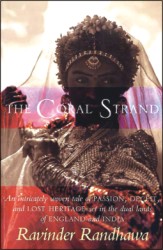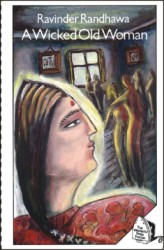|
Interview
Talking Literature
[Ravinder Randhawa was born in India and grew up in Warwickshire. In 1984 she founded the Asian Women Writers Collective, which published two major collections: Right of Way (1989), and Flaming Spirit (1994). She is currently Fellow at St. Mary's College, University of Surrey. She is the author of the acclaimed novel, A Wicked Old Woman (1987), the teenage novel Hari-jan (1992), and the highly praised The Coral Strand (2001). She is currently working on a new novel, The Snakecharmer's Daughter.]
 |
Ravinder Randhawa |
Your first novel, 'A Wicked Old Woman', has been described by Susheila Nasta as "the first explicitly Asian British novel". Does Asian British novel actually exist as a genre?
Yes. In terms of categorisation. Particularly in the eyes of publishers, literary critics, academics, the 'Identity' industry and P.R. people who love niche marketing. In general, 'British-Asian' pertains to novels that are specifically about the Asian community, in terms of its everyday life, traditions, religion, immigration, racism, adaptation or non-adaptation to English culture, culture clash, generation gap and arranged marriages.
Novels are always for universal consumption. Through the chemistry of imagination, intellect and empathy, the stories of one place or people, can generally make sense to 'outside' readers. Often they serve as bridges or messengers, carrying information from one group to the other group, 'explaining' one group to the other group. This is what the Asian British novel, to a large extent, is still doing and still expected to do: carry 'information' from the minority Asian community to the majority English community.
 However, I believe that this categorisation of the 'British-Asian' novel can be a restrictive influence. To explain the 'stranger,' the 'outsider' to the majority community has always been a function of literature, whether that strangeness is in terms of race or beliefs i.e. 'To Kill A Mockingbird'. British-Asian writers may traverse all the territory from fantasy to reality, chick-lit to crime novels, but, in general, if a novel is by a British Asian author and has Asian characters it is immediately placed in the category of British-Asian novel. Or, additionally acquires the embellishment of 'a multi-cultural novel.' Whatever that is! This tends to sideline style and substance, intellectual content and exploration of ideas. However, I believe that this categorisation of the 'British-Asian' novel can be a restrictive influence. To explain the 'stranger,' the 'outsider' to the majority community has always been a function of literature, whether that strangeness is in terms of race or beliefs i.e. 'To Kill A Mockingbird'. British-Asian writers may traverse all the territory from fantasy to reality, chick-lit to crime novels, but, in general, if a novel is by a British Asian author and has Asian characters it is immediately placed in the category of British-Asian novel. Or, additionally acquires the embellishment of 'a multi-cultural novel.' Whatever that is! This tends to sideline style and substance, intellectual content and exploration of ideas.
In 'A Wicked Old Woman' we see you dissect the idea of being marginalised in an alien, quasi-alien society. Will you share your idea of an individual's place in history for us, especially in the Asian British society where one's sense of belonging is meant to be somewhat fuzzy?
This is a fascinating question and a real issue for our times, in terms of globalisation and the rise of fundamentalism. I believe that free-will, exercised within the strict implementation of moral and ethical principles is the essence of an individual. Thus, the individual is required to examine all actions in terms of their impact on the self and others; to grapple with conflicting ideas and demands. Individuals should question traditions and values which cause unhappiness, suffering, and violence; whichever society they live in, whether western or eastern. We all live within a 'pool of knowledge' and we should all contribute to the development of this 'pool' so that humanity progresses for the benefit of the individual and everyone else.
British Asian society provides Asians with a particular opportunity to compare two types of societies and their many different values. Most British Asian's talk about having a good mix of 'eastern/western values'. I think it's very healthy to have to examine ideas such as 'belonging' 'identity' 'culture' and not take them as immutable.
Was it George Eliot, who said that 'convention is not morality.' Neither is convention, belonging. History and race are definitely signifiers of belonging; British Asians are very proud of their backgrounds. Belonging is a very complex issue and should be seen as such.
You were born in India and grew up in England, what "role" do you think English plays in South Asia, where the language has once been a tool used by the ruling class?
 I understand what you mean. Perhaps the answer is in the word 'tool'. If the globe is growing 'smaller', then we all need a language we can talk to each other in. It appears that English is taking on this role. So why not view it as a 'tool'? I understand what you mean. Perhaps the answer is in the word 'tool'. If the globe is growing 'smaller', then we all need a language we can talk to each other in. It appears that English is taking on this role. So why not view it as a 'tool'?
It's not possible to detach it from its imperial past, but equally, just as Madonna constantly re-invents herself, perhaps it should be re-invented: seen as a tool for international commerce and inter-change; a tool to be employed for the benefit of South Asia.
It's up to individual countries to encourage and promulgate their national languages. But all countries teach foreign languages, and English has a long history of being used in South Asia. Why not turn a disadvantage into an advantage?
What is really at the core of this question is how far will English, as a foreign language, as a 'tool' filter down? Or will it still only serve the needs of a particular class?
Your second novel Hari-jan's central character Harjinder is neither Asian nor does she belong to Britain. Where do you as a woman of South Asian descent stand in the British society?
I stand as myself.
With my Asian background and gender. And I stand as an equal to anyone else. Whether Asian or English.
England is a secular democracy. However flawed and imperfect; however class-ridden. Through the sixties, seventies and eighties, England witnessed many social changes; to do with worker's rights, feminism, anti-racism. All these movements left their mark, some for better, some for worse. Societies should never be dormant; they should always be 'rippling' with discussion and debate.
Immigration is nothing new. People have moved around the globe throughout the ages. And generally it's been because of economic need or political persecution. This holds true now too. The migrant adapts, and over the generations achieves an accommodation, a partnership with the 'host' community.
I think it is essential to play a full role in the wider society that one's living in, wherever that happens to be. It is important to take part in the political, educational and social issues. And also, to look after the society where one has made a home. To acknowledge and support all that is valuable in terms of its ideas and practices. Equally, it's important to press for changes where necessary. Complexities and difficulties still exist in England, as do racism and poverty.
The South Asian elements of my life go hand in hand with everything I do. They're not disconnected from anything else. Having a different cultural background shouldn't mean having to be separate, whether that separation is advocated by the majority or the minority. The public and the private are what make an individual.
Whether it's Diwali or Christmas both have a place in my life, as they do for most South Asians.
Copyright
(R) thedailystar.net 2007 |
